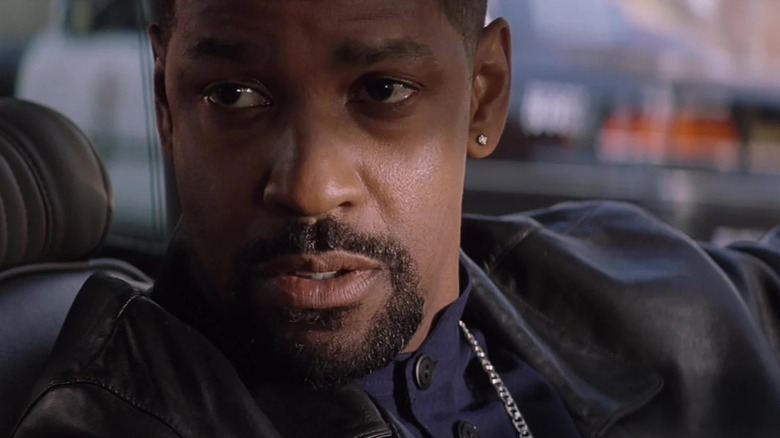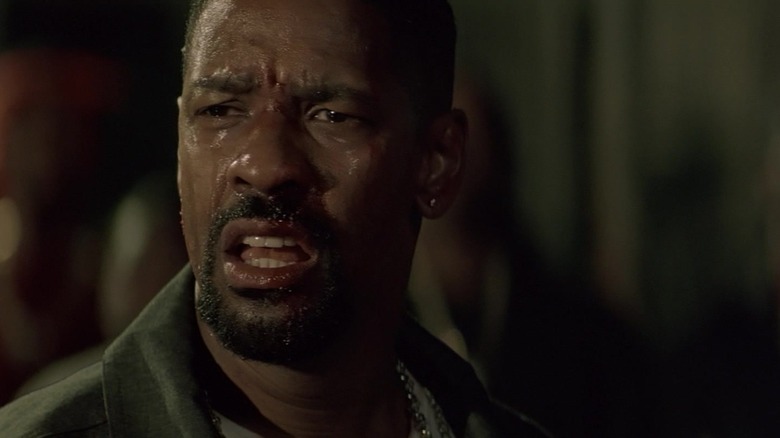Denzel Washington, one of the best actors of his generation, has been on a hot streak ever since he began acting in films in 1981. He had turned in dozens of great, memorable performances, typically playing stalwart, principled, and confident characters; it’s rare that you’ll find Washington playing a sniveling, weak-willed man. His role in Antoine Fuqua’s 2001 cop drama “Training Day” was an aberration for Washington, as his character, Detective Alonzo Harris, committed open acts of violent corruption. He was the villain of the piece and a man who needed to be taught a lesson by his rookie sidekick, the overwhelmed Jake Hoyt, played by Ethan Hawke.
Despite his villainy, however, Alonzo was also a principled character who believed his violent corruption was ultimately an effective tool against his city’s criminal underworld. “They build jails because of me,” he says at one point. “Judges have handed out over 15,000 man-years of incarceration time based on my investigations, okay? My record speaks for itself.”
At the end of “Training Day,” Alonzo is in quite a pickle. He owes a huge amount of money to Russian gangsters as restitution for killing one of them, and Jake, whom Alonzo ordered to be assassinated, escapes and confronts him. Alonzo, out in public, declares that he is untouchable, but he knows he’s been licked. Alonzo is then killed by the Russians, putting his reign of terror at an end.
There is some controversy over Alonzo’s death in “Training Day.” Fuqua once noted that his ending didn’t test well among early-access audiences, as too many of them were fond of Washington and didn’t want to see him killed. It seems that both Fuqua and Washington, however, felt that Alonzo being killed was the only way to end the movie. Washington spoke with NPR about “Training Day” back in 2013, and he talked about fighting for Alonzo’s death, knowing that comeuppance was all he deserved.
Alonzo Harris almost lived at the end of Training Day
Not only did audiences want Denzel Washington to live at the end of “Training Day,” it seems there was an earlier draft of its script wherein Alonzo got away, or at least didn’t face the kind of punishment that he deserved. NPR interviewer Terry Gross asked Washington about the original ending, and Washington noted that he requested it be altered to be more violent:
“[It wasn’t satisfying to] the degree that was satisfying to me. Like, I told the director I couldn’t justify [Alonzo] living in the worst way unless he died in the worst way; that the community turns their back on him, he’s slapped around, crawling around on the ground like a snake and basically, gets filled full of lead. So we just made it a violent, awful ending for him. […] I just thought that’s what he deserved. There was a bit of a cop-out the way the script was, and it smelled like they were looking to do a ‘part two’ or something.”
Washington isn’t explicit about the original unsatisfying ending, but it sounds like Alonzo either lived or slipped away, avoiding the consequences for his actions. In 2001, Washington hadn’t made any sequels in his career and wasn’t keen on becoming part of a commercial franchise. It wouldn’t be until he and Fuqua collaborated on the two “Equalizer” sequels in 2018 and 2023 that Washington would change his mind on the subject.
With the death of Alonzo Harris, Washington was out of any potential sequels and the film came to a morally equitable conclusion. Despite what test audiences wanted, Fuqua and Washington stuck to their guns. “Training Day” ultimately made over $104 million at the box office.
Back in 2019, however, there was some buzz that a prequel to “Training Day,” about a younger Alonzo Harris, was in the works. It was to take place in 1992, around the time of the Rodney King riots. That project seems to have mercifully fallen through.




